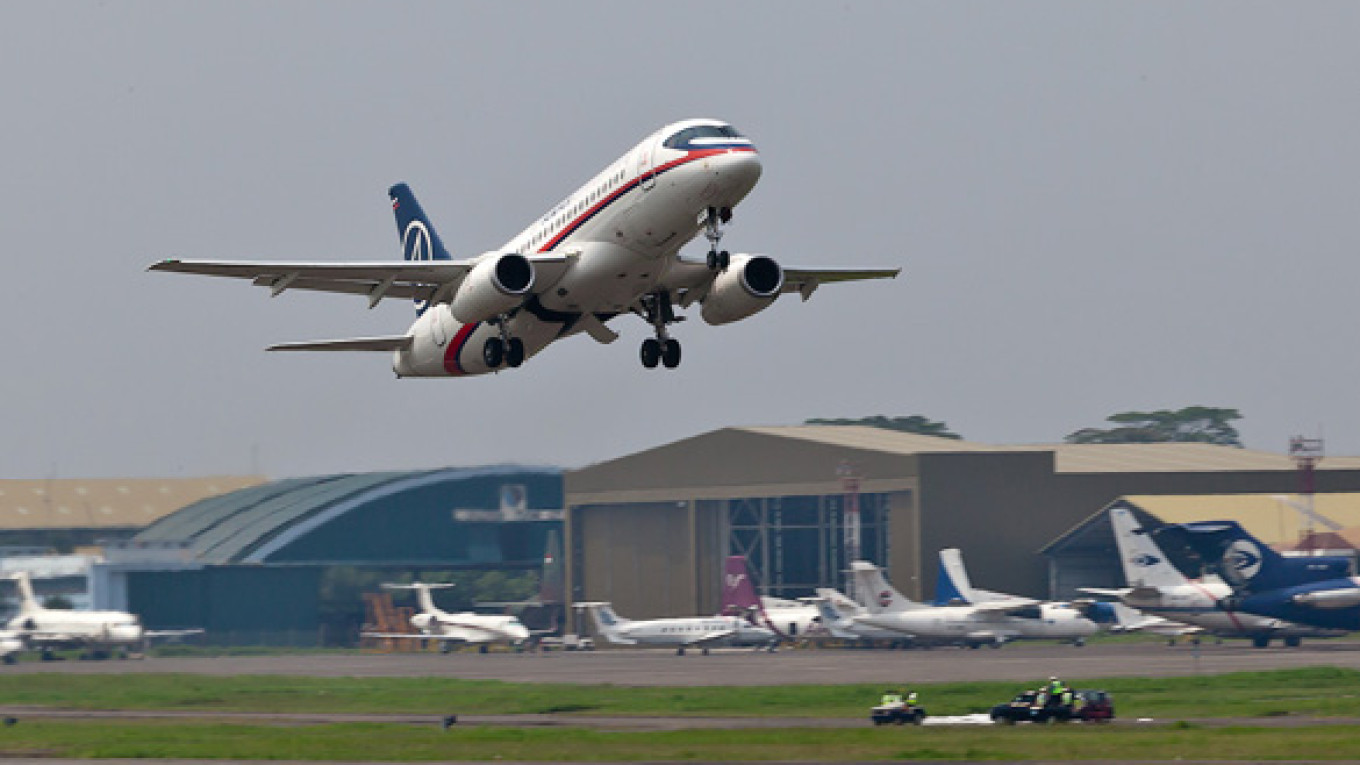A dark cloud was cast Wednesday on the revival of Russia’s aviation industry when a Sukhoi-built Superjet 100 with 50 people on board disappeared from the radar screens of Indonesian flight controllers.
On a promotional tour of Asia to drum up interest among potential buyers, the plane was carrying journalists, industry experts and a crew from Russia, France, Indonesia, Italy and the United States when it took off for its second flight of the day from Jakarta’s Halim Pedanakusuma Airport.
Contact with the plane was lost 20 minutes later at 2:35 p.m. local time (11:35 a.m. in Moscow), moments after it requested permission, for an unknown reason, to descend from an altitude of 3,000 meters to 1,800 meters, RIA-Novosti reported.
The terrain south of Jakarta is forested and mountainous, and the last known position of the Superjet was above the western slopes of extinct volcano Mount Salak, which climbs to 2,221 meters at its highest point.
Indonesian authorities did not immediately rule out the possibility that the aircraft was hijacked. Hope for the plane’s crew was kept alive by local media reports that two phones belonging to people on board rang when they were called, although no one picked up.
The missing aircraft was piloted by Alexander Yablontsev, 57, with more than 25 years of aircraft experience, and Alexander Kochetkov, a test pilot who graduated from flight school in 2003. Yablontsev piloted the Superjet on its first test flight in 2008.
“The pre-flight preparations were conducted fully and, technically, the plane was in good working order,” said a representative from the United Aircraft Building Corporation, which makes Superjets, according to RIA-Novosti.
But a high-altitude crash was looking to be the most likely reason for the plane’s disappearance by Wednesday evening.
“Although the plane was new and the onboard equipment was modern, it was still raw and had not been tested through to completion,” Roman Gusarov, the editor of aviation website Avia.ru, told The Moscow Times.
The weather in that region of Indonesia, the western half of the island of Java, was overcast Wednesday with low-hanging clouds, said Sergei Dolya, a Russian blogger on the Asian tour with the Superjet. He was supposed to have gone on the last flight but stayed at the airport to take photographs.
Local media also reported that there was heavy fog.
Emergency beacons that should have been triggered in the event of a disaster had not been activated, Dolya said on his blog.
Hundreds of volunteers were dispersed to search for a crash site late Wednesday, said the head of the West Java Disaster Management Agency Udjwalprana Sigit, the Jakarta Post newspaper reported. There was conflicting information about the missing plane, but efforts were being concentrated around Mount Salak, he added.
While the search, including a helicopter, was hampered earlier in the day by the weather, Indonesian authorities said they would deploy up to five helicopters on Thursday morning.
Passengers on the plane included eight Russians, two Italians, one Frenchman, one American and 38 Indonesians, Reuters reported. They included staff from the Russian Embassy in Indonesia.
An accident involving the Superjet would deal a body blow to the domestic aviation industry, as the plane is the first new civil airliner to be built in Russia since the Soviet collapse. It has been heralded as the savior of a carrier fleet beset by a poor international reputation.
Talking to delegates at a United Russia conference in March last year, then-Prime Minister Vladimir Putin said the Superjet was a project linked to the “future of our nation.”
The head of the United Aircraft Building Corporation, a state-owned firm, said he would fly out to Jakarta to personally supervise the investigation into the incident.
There have been no fatal accidents involving the Superjet 100 since its maiden flight in 2008, but there were two minor incidents last year. One occurred at the Kazan airport in May and another in March, when a Superjet was forced to return to the Astrakhan airport with a landing gear fault.
A new Superjet costs about $30 million dollars, but there are only a handful currently flying commercially — with Aeroflot and Armenia’s Armavia. The aircraft was designed to replace the aging Soviet Tu-134 aircraft, but it is also being marketed abroad.
The plane that disappeared in Indonesia had completed successful exhibition flights in Myanmar, Pakistan and Kazakhstan and was due to go on to Laos and Vietnam.
Superjet International — which markets the planes globally and is a joint venture between Russia’s Sukhoi and Italy’s Alenia Aeronautica, a subsidiary of Finmeccanica — is targeting sales of 1,000 planes by 2021.
The Superjet is not just a Russian aircraft. Many of its component parts come from foreign companies, including French, German, U.S., British, Swiss and Italian firms.
A Message from The Moscow Times:
Dear readers,
We are facing unprecedented challenges. Russia's Prosecutor General's Office has designated The Moscow Times as an "undesirable" organization, criminalizing our work and putting our staff at risk of prosecution. This follows our earlier unjust labeling as a "foreign agent."
These actions are direct attempts to silence independent journalism in Russia. The authorities claim our work "discredits the decisions of the Russian leadership." We see things differently: we strive to provide accurate, unbiased reporting on Russia.
We, the journalists of The Moscow Times, refuse to be silenced. But to continue our work, we need your help.
Your support, no matter how small, makes a world of difference. If you can, please support us monthly starting from just $2. It's quick to set up, and every contribution makes a significant impact.
By supporting The Moscow Times, you're defending open, independent journalism in the face of repression. Thank you for standing with us.
Remind me later.


